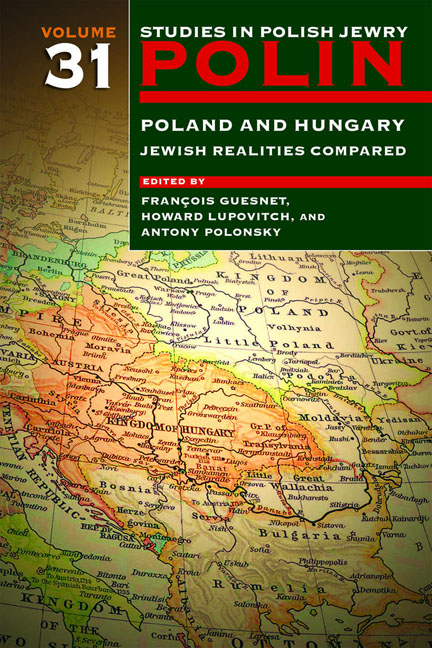Book contents
- Frontmatter
- Dedication
- Editors and Advisers
- Preface
- Polin
- Polin: Studies in Polish Jewry
- Contents
- Note on Place Names
- Note on Transliteration
- Part I POLAND AND HUNGARY: JEWISH REALITIES COMPARED
- JEWISH ACCULTURATION AND INTEGRATION
- JEWISH RELIGIOUS LIFE
- JEWS IN POPULAR CULTURE
- THE INTERWAR YEARS
- THE HOLOCAUST AND ITS AFTERMATH
- PERSONAL REFLECTIONS
- Part II NEW VIEWS
- Part III OBITUARIES
- Notes on the Contributors
- Index
Jews and Poles, 1860–1914: Assimilation, Emancipation, Antisemitism
- Frontmatter
- Dedication
- Editors and Advisers
- Preface
- Polin
- Polin: Studies in Polish Jewry
- Contents
- Note on Place Names
- Note on Transliteration
- Part I POLAND AND HUNGARY: JEWISH REALITIES COMPARED
- JEWISH ACCULTURATION AND INTEGRATION
- JEWISH RELIGIOUS LIFE
- JEWS IN POPULAR CULTURE
- THE INTERWAR YEARS
- THE HOLOCAUST AND ITS AFTERMATH
- PERSONAL REFLECTIONS
- Part II NEW VIEWS
- Part III OBITUARIES
- Notes on the Contributors
- Index
Summary
The roughly half-century before the First World War was a period of striking change for the Jews resident in the Polish lands. While even in 1914 the majority of Polish Jews remained Orthodox in religious observation, followed everyday lives quite different from those of their Christian neighbours, and spoke Yiddish as their primary tongue, even a cursory comparison of the situation in 1914 with 1860 reveals processes of thorough-going transformation that would become even more pronounced by 1939. At the beginning of this period, Jewish emancipation and equal rights were being discussed but had not yet—even in the legal sphere—been realized for most Polish Jews. On the eve of the First World War, in contrast, most Jews in the Polish lands enjoyed some form of legal equality. The only exception was within the Pale of Settlement of the Russian empire where restrictive laws continued in force. In short, Jews were becoming integrated—at least on a legal level—with the rest of society. This process of integration—and challenges to it— characterizes the period discussed here.
The experience of Polish Jewry differed quite radically from that of their Hungarian co-religionists. To start with, throughout this period but especially after the Ausgleich (Austro-Hungarian Compromise) of 1867, Hungary existed as a polity ruled over by ethnic Magyars. While Jews in Budapest lived radically different lives from Jews in Transylvania or Banat, all were under Magyar rule. ‘Polish’ Jews, on the other hand, lived under Habsburg, Russian, and Prussian rule. Thus for Hungarian Jews, there was little question of ‘which culture to assimilate to’. In the Polish lands, three dominant cultures and languages were available: Russian, German, and Polish. Of these, only the Polish—despite its local strength—lacked the backing of state power (with the partial exception of Austrian Galicia). Thus in Hungary the astonishing—from a Polish viewpoint—phenomenon of Orthodox Jews growing up in the late nineteenth century as native speakers of Magyar, as reflected in the memoirs of Jacob Katz. Even in the interwar period, it was unusual for an Orthodox Jew in Poland to speak Polish without any accent.
- Type
- Chapter
- Information
- Polin: Studies in Polish Jewry Volume 31Poland and Hungary: Jewish Realities Compared, pp. 121 - 142Publisher: Liverpool University PressPrint publication year: 2018



